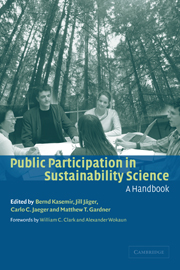Book contents
- Frontmatter
- Contents
- Notes on contributors
- Foreword: science, participation, and sustainability
- Foreword: sustainability, energy use, and public participation
- Preface
- Acknowledgments
- Part I Concepts and insights
- Part II Experiences with IA Focus Groups
- Part III Further forms of participation
- Introduction
- 7 Venture capital and climate policy
- 8 COOL: Exploring options for carbon dioxide-reduction in a participatory mode
- 9 Expert stakeholder participation in the Thames region
- 10 On the art of scenario development
- Part IV Future perspectives
- References
- Index
9 - Expert stakeholder participation in the Thames region
Published online by Cambridge University Press: 22 September 2009
- Frontmatter
- Contents
- Notes on contributors
- Foreword: science, participation, and sustainability
- Foreword: sustainability, energy use, and public participation
- Preface
- Acknowledgments
- Part I Concepts and insights
- Part II Experiences with IA Focus Groups
- Part III Further forms of participation
- Introduction
- 7 Venture capital and climate policy
- 8 COOL: Exploring options for carbon dioxide-reduction in a participatory mode
- 9 Expert stakeholder participation in the Thames region
- 10 On the art of scenario development
- Part IV Future perspectives
- References
- Index
Summary
Introduction
Social and institutional adaptation to climate change impacts must take account of present coping ability and how stakeholders and institutions are likely to evolve over the next few decades. Motivating effective adaptation requires participation; sustainability science in general, and integrated assessments in particular, must blend the formalisms of models with knowledge of institutional change. The ULYSSES project pioneered methods of public participation in integrated environmental assessment, with a focus on climate change and urban greenhouse gas emissions. Citizen Integrated Assessment (IA) Focus Groups were developed and tested in seven cities in Europe. Furthermore, a stakeholder dialogue was conducted with sub-sets of experts, concerning venture capital investment and climate policy.
This chapter relates the experiences of the Social and Institutional Responses to Climatic Change and Climatic Hazards (SIRCH) project to these earlier experiences. The SIRCH project benefited from the examples set by the ULYSSES team. The following section summarizes our stakeholder analysis, using drought management in the Thames region as an example. An outline of scenarios of future drought risk and the analytical methods being developed illustrates the relevance of the research discussed in the first two parts of the present volume to our analyses.
The SIRCH project evaluated capacity to adapt to climate change, and the adaptive processes likely to be employed by stakeholders. The project includes case studies of climatic hazards in southern England (drought and flood), The Netherlands (flood), and southern Spain (drought).
- Type
- Chapter
- Information
- Public Participation in Sustainability ScienceA Handbook, pp. 187 - 200Publisher: Cambridge University PressPrint publication year: 2003
- 3
- Cited by

